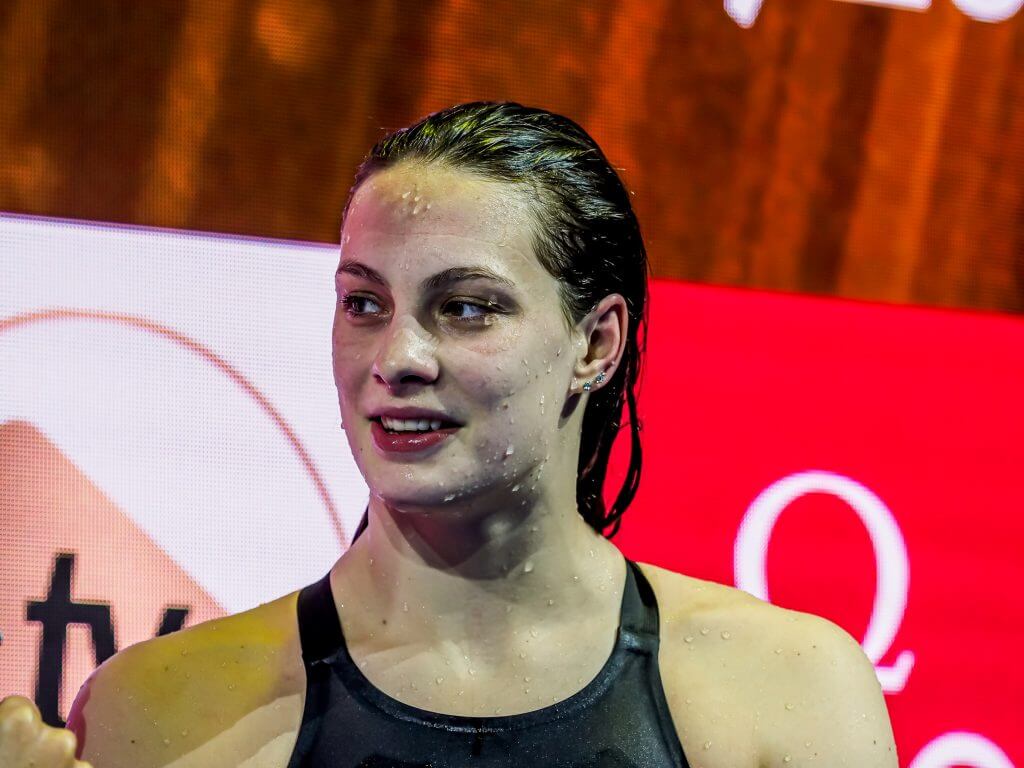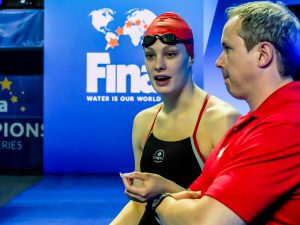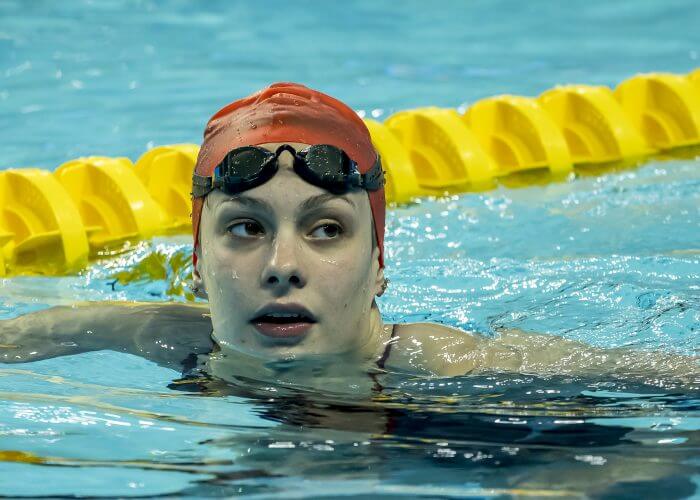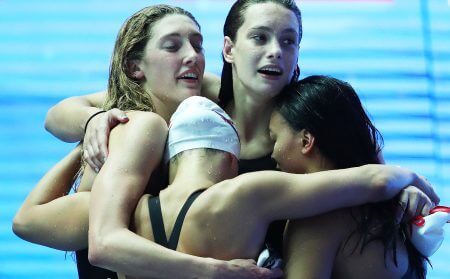Penny Oleksiak More Mature Than In 2016 & Ready to Show What Canada is Made of In 2020

Editorial content for the 2021 Tokyo Olympic Games coverage is sponsored by GMX7.
See full event coverage. Follow GMX7 on Instagram at @GMX7training #gmx7

Sixteen-year-old Penny Oleksiak had the meet of her life at the 2016 Olympic Games.
It started with a bronze medal in the 4×100 free relay on the first night of competition with Team Canada. It was the first relay medal the country had won in swimming since 1992.
The next night she won her first individual medal in the 100 butterfly with a silver. Then four days later she became the first Canadian woman swimmer to win an Olympic gold medal since 1984 when she swam down an extremely talented field in winning the 100 freestyle alongside American Simone Manuel.
She was on top of the world. But in 2017, she quickly came back down.
At the 2017 World Championships, she was fourth in the 100 butterfly and sixth in the 100 freestyle. They were good swims, but she was left off the podium. There was a lot of pressure put on her by the people around her, and she struggled to cope with it.
So after 2017, Oleksiak parted ways with her coach Ben Titley, who was instrumental in her success in Rio, and moved from the High Performance Centre to Toronto Swim Club.
“Ben is very intense and every time you come to the pool, you have to be 100% on all the time,” Oleksiak said while on a training trip in Fort Lauderdale. “And after 2017, I was at a point where I wasn’t able to be 100% on all the time and I wasn’t going to waste anyone’s time showing up and not being 100% percent there.
“I took time for myself and figured things out and got back into it.”

Penny Oleksiak with Ben Titley at the 2019 FINA Champions Series in Indianapolis. Photo Courtesy: Peter H. Bick
Oleksiak wanted to be a regular teenager again, and she put swimming aside briefly so she could escape the pressures of the pool. She was still training, but struggled to find consistency. She was bouncing around training groups and her results suffered. At the 2018 Commonwealth Games, she didn’t win any individual medals. She didn’t view it as a disappointment, but rather she was able to see where she needed to improve in life and in swimming.
Later that year in 2018, she qualified to swim at the Pan Pacific Championships, where she would race against some of the best in the world from the United States, Australia and Japan in Tokyo, the city that would also host this summer’s Olympic Games. It would be a perfect opportunity to line up against some of her best rivals.
But Oleksiak declined to go to Pan Pacs, saying she was “a little bit stressed” before the meet and needed a break.
She took off a month from the pool. She traveled with her sister. She went to concerts. She needed to clear her head.
Then in the fall of 2018, she came back to Titley.
“He hasn’t really changed much,” Oleksiak said. “He is a tough coach but it pays off in the end.”

Penny Oleksiak had a great 2019 on Canada’s relays. Photo Courtesy: Peter H. Bick
In 2019, Penny Oleksiak was able to get back on track at the World Championships in Gwangju, South Korea. Canada won a bronze medal in the 4×100 free relay on the first night of the meet, and Oleksiak split a 52.6, which was faster than what she swam in Rio. The quartet of Kayla Sanchez, Taylor Ruck, Oleksiak and Maggie MacNeil broke the Canadian record at 3:31.78 and were with the Australians and Americans through the first three legs.
Four nights later, Oleksiak anchored Canada’s 4×200 free relay, unleashing a monstrous 1:54 split to give them the bronze medal. It was another Canadian record (7:44.35) and it was Penny’s best split by six tenths since her swim in Rio.
Individually, she finished sixth in the 200 free final and scratched out of the 100 free entirely. But relays were the focal point this year.
On the final night of the meet, the Canadians once again won another relay medal, this time in the 4×100 medley where Oleksiak swam the freestyle leg and split a 52.48. It was even quicker than what she swam a week prior, and it was a huge confidence boost for her after she didn’t have the best results in 2017 and 2018.
“I kind of just focused on getting in the right mindset and getting back to being super confident in my races at Worlds,” Oleksiak said. “Just doing those relays helped a lot with that and now I’m just excited for the season.”
Oleksiak trains with relay teammates Sanchez and Ruck every day at the High Performance Centre in Toronto. She said:
“It’s super exciting because Kayla and Taylor can both push themselves so hard every day. It’s awesome to have that motivation every practice I come to.”
Ruck spent the last year training and studying at Stanford University in California. But this year she is back training in her home country in Toronto, alongside Oleksiak and Sanchez, who she will likely go to battle with in Tokyo in the freestyle relays.
“It’s always fun to train with them,” Oleksiak said. “Taylor is great. She just works so hard day in and day out, so it’s awesome to have that motivation.”

Canada’s 4×100 free relay share a hug at the 2019 World Championships. Photo Courtesy: Swimming Canada/Ian MacNicol
The relays are a definite focus for the Canadian team, knowing they have a legitimate shot at a medal in all three, as well as a chance to steal the gold in a couple of them.
“It’s definitely on all of our horizons and we are all looking forward to relays. We are trying to build ourselves individually and it will come together once we get there.”
For the last few years, Canada had solid relays but seemed to be missing one piece in each of them to compete with the Americans and Australians. This year, they have that piece in 19-year-old Maggie MacNeil, who shocked the world in winning the 100 butterfly at the World Championships last year.
“It’s real exciting to see another Canadian up on the ranks again,” Oleksiak said of MacNeil. “It’s awesome to see how much a threat Canada can be this year.”
Oleksiak also credits the rest of the Canadian sports community in pushing her to be the best athlete she can be, citing the NBA world champion Toronto Raptors team, U.S. Open tennis champ Bianca Andreescu, and the national junior team for hockey, which just won the 2020 IIHF World Junior Championship.
Oleksiak’s training group is a good mix of veterans and young up-and-comers. She shares a training lane with Ruck, who will be 20 in May. Across the pool from her is Yuri Kisil (24) and Mack Darragh (26). She also trains with members of the Canadian junior team in Finlay Knox (19) and Josh Liendo (17).
Oleksiak, still just 19, enjoys the young energy she is surrounded by in training. She said:
“I think it’s fun. It’s awesome to learn from them and also teach them wherever I can because I still am super young, and I was their age when I was doing the same things they’re doing now. It’s just cool to see the next generation.”
This year, she shifts her focus to what would be her second Olympic Games in Tokyo. The Olympic Trials are first, March 30-April 5, in Toronto, where she hopes to make the team in the same events she swam in Rio: the 100 fly and 100 free, and possibly the 200 free.
The world will be seeing a different Penny Oleksiak in 2020. She said:
“I just am more of a mature athlete and a more mature person. I think I have a lot more things to work with with things happening in my life. But also my body has changed so much. I’m a stronger athlete now.”




